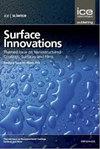拉伸载荷下柔性超双疏表面的润湿稳定性
IF 3.5
4区 材料科学
Q3 CHEMISTRY, PHYSICAL
引用次数: 2
摘要
润湿稳定性对油水环境中使用的超双疏表面非常重要。保持柔性超双疏表面在拉伸下的润湿稳定性是一个挑战。本研究通过在柔性聚二甲基硅氧烷基底上覆盖超两疏粉末,制备了具有稳定超两疏性的拉伸柔性表面。通过化学取代反应和改性处理制备了由微粒子和纳米粒子组成的超双疏粉。制备的柔性表面对水、煤油和花生油的接触角分别为155°、152°和153°,表现出超疏水性和超疏油性。通过水滴和油滴去除表面污染物,研究了制备的柔性表面的自清洁性能。研究了拉伸作用下柔性表面的润湿性和形貌。研究发现,当拉伸应变达到60%时,制备的柔性表面由于拉伸后仍保持微纳双尺度结构而保持稳定的超疏水性和超疏油性。所制备的具有湿润稳定性的超双疏粉末涂覆柔性表面有望在液体驱避领域得到应用。本文章由计算机程序翻译,如有差异,请以英文原文为准。
Wetting stability of flexible superamphiphobic surfaces under stretching loading
Wetting stability is important for superamphiphobic surfaces used in oil–water environments. Maintaining the wetting stability of flexible superamphiphobic surfaces under stretching is challenging. Here, flexible surfaces with stable superamphiphobicity under stretching were fabricated by covering flexible polydimethylsiloxane substrates with superamphiphobic powders. Superamphiphobic powders composed of micro- and nanoparticles were prepared by a chemical substitution reaction and modification treatment. The fabricated flexible surfaces possessed contact angles for water, kerosene and peanut oil of 155, 152 and 153°, respectively, exhibiting superhydrophobicity and superoleophobicity. The self-cleaning properties of the fabricated flexible surface were studied by removing contaminants from the surfaces using water and oil droplets. Also, the wettability and morphology of the fabricated flexible surface under stretching were investigated. It was found that the fabricated flexible surface maintained stable superhydrophobicity and superoleophobicity when the stretching strain reached 60% due to the fact that it still kept micro–nano double-scale structures after being stretched. The fabricated flexible surface coated with superamphiphobic powders with wetting stability is expected to be used in the field of liquid repellency.
求助全文
通过发布文献求助,成功后即可免费获取论文全文。
去求助
来源期刊

Surface Innovations
CHEMISTRY, PHYSICALMATERIALS SCIENCE, COAT-MATERIALS SCIENCE, COATINGS & FILMS
CiteScore
5.80
自引率
22.90%
发文量
66
期刊介绍:
The material innovations on surfaces, combined with understanding and manipulation of physics and chemistry of functional surfaces and coatings, have exploded in the past decade at an incredibly rapid pace.
Superhydrophobicity, superhydrophlicity, self-cleaning, self-healing, anti-fouling, anti-bacterial, etc., have become important fundamental topics of surface science research community driven by curiosity of physics, chemistry, and biology of interaction phenomenon at surfaces and their enormous potential in practical applications. Materials having controlled-functionality surfaces and coatings are important to the manufacturing of new products for environmental control, liquid manipulation, nanotechnological advances, biomedical engineering, pharmacy, biotechnology, and many others, and are part of the most promising technological innovations of the twenty-first century.
 求助内容:
求助内容: 应助结果提醒方式:
应助结果提醒方式:


